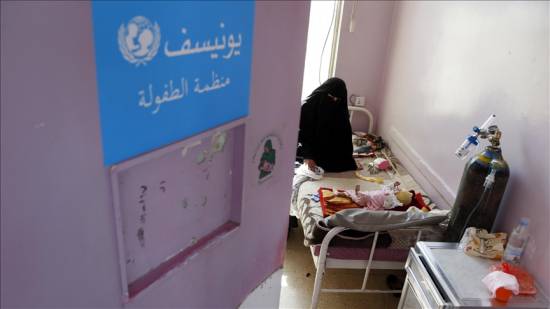Yemen remains the world's worst humanitarian crisis with nearly 80% or more than 24 million of its people needing humanitarian assistance and protection and more than 13 million in danger of starving to death, the UN humanitarian office said Monday.
Vanessa Huguenin, a public information officer at the UN office of Humanitarian Affairs, in an interview with Anadolu Agency cited a new survey showing that 16,500 people live in famine-like conditions, a figure expected to almost triple by June 2021.
"Overall, 13.5 million people in Yemen are currently at risk of starving to death or struggling to get enough food to feed their families amid the ongoing conflict," said Huguenin, quoting the survey by the Integrated Food Security Phase Classification (IPC).
That survey, put out by the UN's food agency (FAO), said that by June 2021, this number might have increased by 3 million, meaning that more than half of the country may live in acute hunger.
"Preventing famine is the top priority right now. Everyone must do everything they can to prevent famine from taking hold," said Huguenin.
"We already know how to stop famine in Yemen because we did it two years ago when the world chose to help."
She said that helped save millions of lives, including tens of thousands of children with severe malnutrition.
"COVID-19 is an added burden on the fragile health system, where only 50% of facilities are functional," said Huguenin.
"This has discouraged the population from seeking treatment for other deadly diseases and conditions."
The humanitarian office says that ultimately, solving the crisis in Yemen will require a political solution.
"It will also require dependable support for Yemen's battered economy. In the meantime, millions of people need humanitarian assistance to survive," said Huguenin.
She noted UN humanitarian chief Mark Lowcock's words while briefing the Security Council in New York on Nov. 11.
"A nationwide cease-fire, as we have long advocated, would go a long way to protecting civilians," he said.
"It would also help stop the slide towards famine, as data confirms the worst hunger is in conflict-affected areas."
Yemen has been beset by violence and chaos since 2014, when Iran-aligned Houthi rebels overran much of the country, including the capital Sana’a.
The crisis escalated in 2015 when the Saudi-led coalition launched a devastating air campaign aimed at rolling back Houthi territorial gains.
According to the UN Office for the Coordination of Humanitarian Affairs, the conflict in Yemen has so far claimed the lives of 233,000 people.
On Dec. 30 last year, at least 22 people were killed in three explosions that rocked the airport in Yemen's southern port city of Aden soon after members of the newly formed government arrived in the temporary capital.
At least 50 others were injured in the attacks, the Yemeni Interior Ministry said in a statement.
Among the casualties were civilians, airport workers and officials present in the area to greet Cabinet members, the statement said.
Members of the Yemeni government survived the attack without injuries, it added./aa


